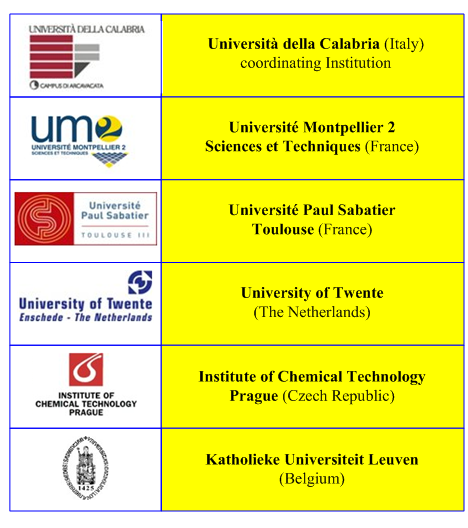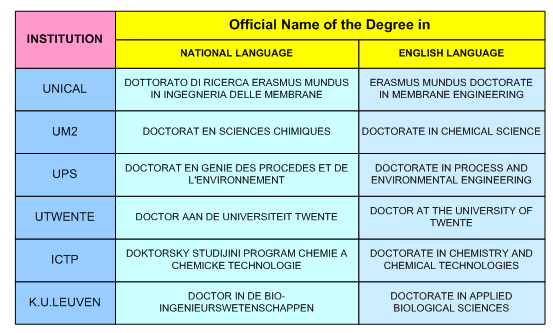About us
 |
 |
 |
|
Erasmus Mundus is a cooperation and mobility programme in the field of higher education, promoted by the Executive Agency for Education, Audiovisual & Culture (EACEA- European Union) that aims to enhance the quality of European higher education and to promote dialogue and understanding between people and cultures through cooperation with Third Countries. In the framework of Action 1 (“implementing joint programmes at postgraduate level”), the Erasmus Mundus Doctorate in Membrane Engineering(EUDIME) is one of the nine selected proposals among 151 applications submitted to EACEA on 2010. EUDIME is designed to implement - at international level - excellence, innovation, mobility and multi-disciplinarity in investigation approaches related to membrane science and technology. The consortium includes six leading partner institutions : |
 |
|
The EUDIME consortium also includes ten associate partners: University of Lisboa (Portugal), University of Zaragoza (Spain), RWTH Aachen (Germany), the European Membrane Society, the European Membrane House, and five industrial companies well-reputed in the field: SAPIO S.r.L. and GVS S.p.A. (Italy), Veolia Environment (France), Alfa Laval A/S (Denmark), and Mikropur s.r.o.(Czech Republic). Many other industrial companies, universities and institutions support this action. The HEI members are also involved in the Erasmus Mundus Master in Membrane Engineering - EM3E, co-ordinated by University of Montpellier 2. Based on 4.5 years (2004-2009) of experience and high-level international cooperation in the framework of the FP6 European Network of Excellence “NanoMemPro – Expanding membrane macroscale applications by exploring nanoscale material properties”, the EUDIME consortium already shares a common platform for advanced and high-competitive training and research activities on membrane engineering at European level, with worldwide recognized excellence. |
 |
|
The Programme, which maximum duration is 4 years - offers a unique opportunity to doctoral candidates for career in academia or in industry as R&D membrane engineers. Research and training activities cover a large spectrum of emerging and industrially-assessed applications in the field of membrane engineering, such as: desalination and water treatment, gas separation at molecular level (CO2 capture, O2/N2/H2purification etc.), (bio)catalytic membrane reactors (MBR, PEM fuel-cells, biofuel production etc.), membrane processes for agro-food applications, tissue engineering/artificial organs/biomedical devices etc. The programme, mainly laboratory-based, also includes two mandatory mobility periods in two different Universities of the consortium, scheduled as relevant and instrumental to the fulfilment of the research activities of the doctoral candidate. Teaching/training activities provide general knowledge on membrane science and technology, technical skills in specific thematic fields, transferrable skills in terms of intellectual capital management, valorisation, commercialisation and entrepreneurship. In order to address the professional career development and employability of PhD students, the industrial companies involved in the programme will play a key role in orienting research projects and in co-supervision activities. The official language is English; specific courses on country languages and culture will be provided in each visited Institution. The successful candidates will be awarded a fully recognized multiple and/or a joint degree issued by three consortium institutions (the Home University, where the doctoral candidate will spend the most part of training/research time, and two Hosting Universities visited during mobility periods), completed by a diploma supplement. |
 |
 EUDIME - Erasmus Mundus Doctorate in Membrane Engineering
EUDIME - Erasmus Mundus Doctorate in Membrane Engineering